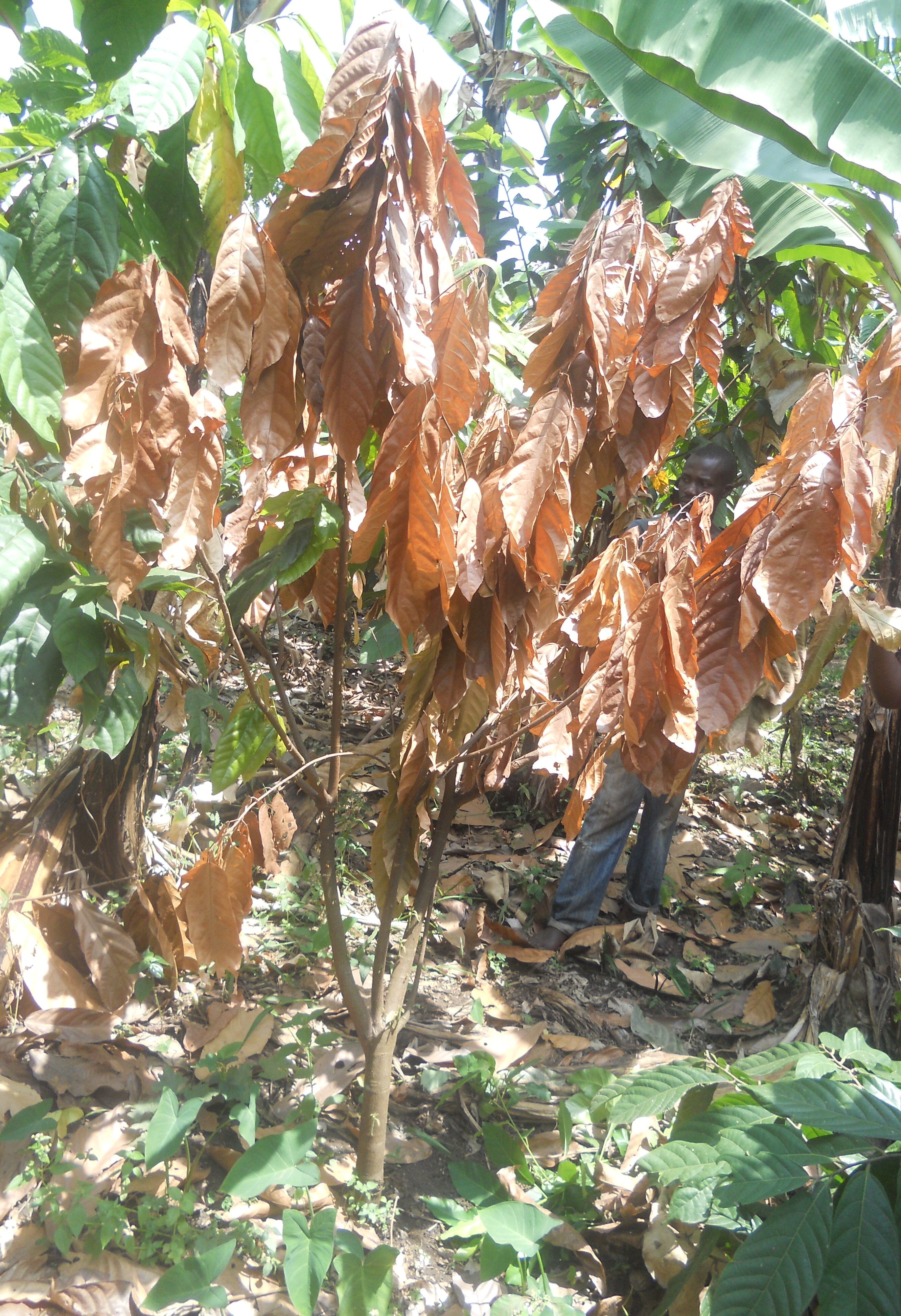Team members created and conducted diagnostic surveys in five major coffee-producing regions of Uganda to characterize existing coffee-banana agroforestry systems and identify the major biotic and abiotic constraints. In each region, 10 districts were selected at random and in each district, 10 households selected randomly were sampled and data collected on their farms. Results showed diverse cropping systems, including coffee as a mono-crop, banana as a monocrop, coffee-banana intercrop, and coffee-banana-shade trees inter-crop, as well as different kinds of coffee growing.
PEER researchers combined farmers’ knowledge and information on regional tree species to make recommendations for appropriate shade trees for the various coffee growing regions and highlight “bad neighbor” trees for coffee and bananas. Among the biotic constraints, farmers reported weeds, particularly couch grass and annual broad-leaved weeds, as well as pests and diseases; particularly the black coffee twig borer (BCTB) for coffee and banana bacterial wilt (BBW) for bananas. Farmers also reported declining soil fertility, limited moisture, soil erosion, and an assortment of socioeconomic constraints, including lack of capital; limited and unaffordable labor, input, and output markets; and several gender-related issues. Most farmers were also aware of climate change and its effects, particularly, prolonged drought and poor yields in both coffee and bananas. At least 50% of the farmers interviewed reported that they plant trees as an adaptation to climate change. Limited space and lack of seedlings were reported as the major reasons hindering farmers from planting more trees.
Researchers conducted follow up studies in the surveyed regions, collecting samples of major pests and diseases of coffee and banana trees. Regional differences in the prevalence of inspect pests were identified and used to update the existing Integrated Pest Management (IPM) package for the twig borer. Media (print and electronic) and farmer-to-farmer communication approaches were the most important sources of agricultural information for the farmers. However, access and use of agricultural credit facilities is still very low in Uganda.
The team used the project results to generate training materials, posters and manuscripts for the farmers, an effort that was significantly expanded thanks to a PEER Evidence to Action supplement awarded to Dr. Kagezi and his team in January 2018. Those funds supported a training needs assessment, development of a training curriculum, and delivery of training to more than 700 Ugandan farmers. The information gathered in the project was also used to update the coffee management calendars which have been used to train farmers and other stakeholders in Farmer Field Schools across the coffee-banana growing regions. In addition, the project contributed to building and improving the research capacity for Coffee Research Center through training of two Master’s-level students and provision of short-term courses to students, research technicians, and other COREC staff. The training curriculum developed under the supplement was selected for incorporation into the coffee training center at the National Coffee Research Institute (NaCORI), Kituza. It will also be used by other institutions involved in the promotion of coffee-related activities, such as the Uganda Coffee Development Authority (UCDA); Café Africa Uganda; the Directorate of Extension services of the Ministry of Agriculture, Animal Industry, and Fisheries (MAAIF); Hanns R. Neumann Stiftung (HRNS); and various Ugandan universities.
Although the PEER project and supplement funding have ended, Dr. Kagezi and his team continue to work on several ongoing research and training efforts building on their PEER research, including two major projects funded directly by USAID.
PublicationsG.H. Kagezi, P. Kucel, L. Nakibuule, J. Kobusinge, V. Tumuhaise, S. Mpiira, L. Jassogne, D. Mukasa, P. van Asten, and W.W. Wagoire. 2018. Characterising the Coffee-Banana Agroforestry Systems: an Entry Point for Promoting Coffee and Banana Growing in mid-Northern Uganda.
Uganda Journal of Agricultural Sciences 18(2): 111-121.
http://dx.doi.org/10.4314/ujas.v18i2.5 Judith Kobusinge, Godfrey H. Kagezi, Abisagi Kasoma, Patrick Kucel, Lilian Nakibuule, Ivette Perfecto, and William W. Wagoire. 2018. Farmers’ Knowledge of Pests and Diseases in the Coffee-Banana Agroforestry Systems of Mid-Eastern Uganda.
Journal of Agriculture and Environmental Sciences 7(2): 109-119.
https://doi.org/10.15640/jns.v7n2a12 Lilian Nakibuule, Godfrey H. Kagezi, P. Kucel, J. Kobusinge, W.W. Wagoire, G. Kisolo, and I. Perfecto. 2017. Farmers’ Knowledge of Agronomic and Abiotic Constraints in the Coffee-Banana Agroforestry Systems of South-Western Uganda.
International Journal of Nutrition and Agriculture Research 4(2): 105-112.
http://www.ijnar.com/archives1.php?volume=4&issue=2 G.H. Kagezi, P. Kucel, J.P. Egonyu, G. Ahumuza, L. Nakibuule, J. Kobusinge, and W.W. Wagoire. 2014. Implications of Black Coffee Twig Borer on Cocoa in Uganda.
Uganda Journal of Agricultural Sciences 15(2): 179-189.
http://journal.naro.go.ug/index.php/ujas/article/view/385/335 



